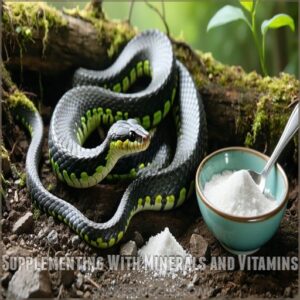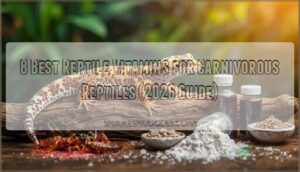This site is supported by our readers. We may earn a commission, at no cost to you, if you purchase through links.

Spot-clean the enclosure daily, deeply clean monthly, and keep humidity and temperature just right—think Goldilocks here!
Offer a varied diet of appropriately sized prey like mice or quails, making sure they’re packed with essential vitamins like A, D3, and E.
If your snake struggles with shedding or appetite, reptile-safe vitamin supplements can help.
Limit excessive handling to reduce stress, and keep an eye out for signs of illness like lethargy or appetite changes.
Regular vet check-ups seal the deal, keeping your slithery companion happy and healthy.
Table Of Contents
- Key Takeaways
- Snake Immune System Basics
- Boosting Snake Immune System
- Creating Clean Environment
- Nutrition for Immune Boost
- Regular Health Checks
- Frequently Asked Questions (FAQs)
- How do you treat a respiratory infection in a snake?
- How can one strengthen their immunity naturally?
- How can a snake eat a healthy diet?
- Why is respiratory health important for snakes?
- Are there medical treatments for respiratory diseases in snakes?
- What is oxygen therapy for snakes?
- How to boost a snakes immune system?
- Can you build immunity to snake venom?
- Does vitamin C help with snake venom?
- Do snakes have an immune system?
- Conclusion
Key Takeaways
- Keep your snake’s enclosure clean, maintain optimal temperature and humidity, and provide hiding spots to reduce stress and support immunity.
- Feed a varied diet with appropriately sized prey and consider reptile-safe vitamin supplements to ensure necessary nutrients like A, D3, and E.
- Limit excessive handling and loud noises to minimize stress, which can weaken the immune system.
- Schedule regular vet check-ups to catch early signs of illness and ensure your snake’s overall health remains in top condition.
Snake Immune System Basics
A snake’s immune system works best when you balance its environment, diet, and overall care.
Understanding how factors like temperature, nutrition, and stress affect immunity helps you keep your snake healthy and thriving.
Factors Influencing Immune System
Boosting snake immunity hinges on nutrition, age, and environmental factors.
Proper nutrients fuel immune cells, ensuring strength, and age impacts overall resilience, especially in younger or older snakes.
Environmental stress from poor humidity or temperature creates immune vulnerabilities, and providing the right environment setup is essential for a snake’s overall health.
Remember, the reptile immune system works best in ideal conditions, making temperature-dependent immunity a reality, and support your snake’s health by reducing stress and prioritizing balance.
Importance of Proper Husbandry
You can’t expect a healthy reptile immune system without nailing your snake’s husbandry.
A clean enclosure, proper humidity control, and consistent temperature management are your go-to tools for keeping stress low and boosting immunity.
Follow these steps:
- Spot-clean cages daily and deep clean monthly.
- Monitor temperature daily with a digital thermometer.
- Use hygrometers for humidity control.
- Limit handling to reduce stress.
Role of Nutrition in Immunity
A snake’s immune system thrives on proper nutrient intake.
Meeting dietary needs with a variety of prey guarantees immune boosters like vitamins A, D3, and E are covered.
Reptile nutrition advice often highlights vitamin supplementation for immune system support.
Snake supplements, combined with food variety, complete a balanced snake nutrition guide.
Good diet choices are essential for reptile immune system health.
Boosting Snake Immune System
Snakes rely on a fine-tuned immune system to fend off illnesses, but stress, poor diet, or improper care can weaken it.
To strengthen snake immunity, focus on their overall well-being. Start by addressing key areas that impact their immune system:
- Maintain ideal temperatures: A snake’s immune system works best within their preferred temperature range (POTZ).
- Provide a nutrient-rich diet: Feed appropriately sized prey, and consider using snake health supplements that contain vitamins like A, D3, and E for immune system support.
- Reduce unnecessary stress: Avoid excessive handling, loud noises, and sudden changes in their environment, which can weaken immunity over time.
Using snake vitamin supplements can help fill nutritional gaps and support immune function.
Prioritizing these simple steps can improve reptile care and boost snake immunity naturally.
Creating Clean Environment
Keeping your snake’s enclosure clean isn’t just about avoiding unpleasant smells—it directly impacts their immune health.
A spotless habitat reduces harmful bacteria, fungi, and parasites, giving your snake a healthier, stress-free environment.
Proper Enclosure Setup
A proper enclosure design keeps snakes happy and healthy.
Use ventilation systems for airflow and hygiene, while choosing substrates that are easy to clean.
Add lighting solutions to mimic natural day-night cycles.
Maintain tight lids to prevent escape and maintain proper humidity control.
A well-planned snake enclosure creates a perfect balance between comfort and temperature control.
For proper snake care, investing in quality snake enclosures is essential to prevent health issues.
| Feature | Purpose | Example | Maintenance Tip | Benefit |
|---|---|---|---|---|
| Ventilation | Airflow & hygiene | Mesh covers | Clean vents monthly | Reduces bacteria buildup |
| Substrate | Cleanliness | Aspen bedding | Replace weekly | Prevents infections |
| Lighting | Day-night balance | UVB bulbs | Replace annually | Supports behavior |
| Humidity Control | Moisture balance | Fogger systems | Refill as needed | Skin health improved |
| Enclosure Design | Security & comfort | Glass terrarium | Inspect for cracks | Prevents escapes |
Maintaining Humidity and Temperature
Keeping the right ambient temperature and humidity levels is like setting up a perfect climate zone for your snake.
Use heat sources to maintain thermal gradients—cooler spots around 70°F and basking spots over 100°F. A hygrometer ensures humidity control (like 40-60% for Milk Snakes).
For superior reptile care systems, it’s vital to monitor these conditions closely, ensuring temperature-dependent immunity thrives within their optimum temperature zone, boosting health naturally.
It’s essential to verify humidity levels to maintain this environment, and for more information, visit the reptile care article to learn about proper monitoring techniques.
Reducing Stress and Handling
Stress management starts with providing a stress-free environment.
Limit handling to when it’s necessary and be gentle—snakes aren’t fans of rough treatment.
Here’s how to reduce snake stress:
- Set up environmental enrichment like hides and climbing spots.
- Give your snake time to adjust after feeding or cleaning.
- Avoid overstimulating them with frequent handling, which is crucial for maintaining a stress-free and healthy environment for your snake, ensuring proper care.
Nutrition for Immune Boost
Feeding your snake the right diet plays a huge role in its immune health, helping ward off illnesses and keep it thriving.
By including nutrient-rich prey and the right supplements, you’ll guarantee their body gets everything it needs to stay strong and healthy.
Essential Vitamins for Snakes
Did you know snakes rely on essential vitamins like A, D3, and E to stay healthy?
These vitamins help with eye health, calcium absorption, and cell protection.
While balanced snake nutrition from prey can prevent vitamin deficiency, indoor reptiles may need vitamin supplementation.
Proper snake vitamin supplements can help fill nutritional gaps and support immune function.
Always consult a vet before using mineral supplements to keep your reptile health in check, ensuring the right balance of vitamin supplementation and reptile health.
Balanced Diet and Prey Items
Keeping your snake’s reptile diet on point means focusing on prey variety and food quality.
Offer a mix of mice, rats, or even quails to hit those nutrient balance targets.
A well-balanced snake food mix is essential for maintaining peak health.
Stick to a consistent feeding schedule to support snake nutrition and boost reptile health.
Properly-sized prey is key—too big is like biting into an impossible burger! Keep it manageable.
Supplementing With Minerals and Vitamins
Adding nutritional supplements can make a big difference in snake health.
Mineral supplements like calcium powder support strong bones and overall well-being.
Vitamin boosts, such as D3, aid immune support and proper digestion.
Sprinkle dietary additives sparingly on prey to meet vitamin requirements.
A little thoughtful vitamin supplementation goes a long way toward creating immune system boosters and improving snake nutrition.
Regular Health Checks
You’ve got to keep an eye on your snake’s health, and regular check-ups are the best way to catch problems before they get serious.
A quick visit to the vet can help spot hidden issues, ensuring your snake stays strong and healthy.
Identifying Signs of Illness
Spotting signs of illness early can save your snake’s life.
Watch for lethargy signs like unusual hiding, respiratory issues such as wheezing or nasal bubbles, or skin problems like poor shedding.
Digestive troubles, weight loss, and infection symptoms—like mouth sores—are red flags.
Quick action helps prevent snake health issues and strengthens their immune system against disease, to prevent ignoring subtle symptoms and ensure timely intervention.
Preventing Common Health Issues
Keeping your snake healthy starts with solid disease prevention.
Focus on snake hygiene by cleaning enclosures regularly and maintaining proper humidity and temperature.
Monitor for common health issues like respiratory infections or mites, as early health monitoring can prevent bigger problems.
Understanding snake health issues is essential for identifying potential problems before they become severe.
Consistent reptile care, paired with nutrition and stress management, works as powerful immune boosters for an immune system boost.
Scheduling Veterinary Check-Ups
A yearly veterinary checkup is non-negotiable for your snake’s health.
These visits let professionals review their medical history, perform snake exams, and track health records.
Adjust your check-up schedule if your snake shows unusual behavior, as early detection of issues through routine reptile health tips boosts the immune system.
Don’t skip appointments—consistent veterinary care prevents problems from sliding under the radar.
Frequently Asked Questions (FAQs)
How do you treat a respiratory infection in a snake?
Think of your snake wheezing like a warning light on a dashboard—act fast!
Use nebulization with saline, keep the habitat warm (within their POTZ).
And consult a reptile vet for antibiotics or advanced care.
How can one strengthen their immunity naturally?
Eat fresh fruits, veggies, lean proteins, and healthy fats.
Stay hydrated, exercise moderately, and sleep well.
Manage stress with relaxation or hobbies. These simple changes work wonders to keep your immune system running strong naturally.
How can a snake eat a healthy diet?
Feed your snake appropriately sized prey, like mice or rats, that match its dietary needs.
Offer variety occasionally, such as quail, and make certain prey is fresh.
Supplements can fill nutrient gaps in captive diets.
Why is respiratory health important for snakes?
Respiratory health keeps your snake strong and thriving.
Breathing difficulties stress their body, weaken immunity, and invite infections.
A clean environment, proper humidity, and temperature control are key to preventing breathing issues and supporting overall health.
Are there medical treatments for respiratory diseases in snakes?
It’s like dealing with a stubborn cold—treating respiratory diseases in snakes often involves antibiotics, nebulization (inhaling medicated mist), and proper humidity.
A vet knows the best course, so don’t skip that appointment to ensure the use of proper humidity and other treatments.
What is oxygen therapy for snakes?
Oxygen therapy helps snakes breathe easier when fighting respiratory illnesses.
By delivering concentrated oxygen, it supports their recovery by reducing stress on their lungs and promoting healing.
Always work with a reptile vet for proper treatment.
How to boost a snakes immune system?
Keep your snake’s immune system strong by maintaining ideal temperature and humidity, ensuring a clean enclosure, offering a balanced diet, and reducing stress.
Regular vet check-ups and proper hydration also play key roles in prevention.
Can you build immunity to snake venom?
Building immunity to snake venom is like training for a marathon—it takes time and exposure.
Through controlled venom doses, your body can produce antibodies, but this risky process should only be done under expert supervision.
Does vitamin C help with snake venom?
Vitamin C doesn’t neutralize snake venom directly, but it supports your body’s healing and immune functions.
While it’s no substitute for antivenom, staying healthy with nutrients like vitamin C can aid recovery after treatment.
Do snakes have an immune system?
Yes, snakes have an immune system, though it’s less developed than mammals’.
It fights infections using white blood cells and antibodies, but it works best when they’re kept at their ideal temperature and stress-free.
Conclusion
Think of your snake’s immune system like a fortress—it thrives on clean conditions, balanced nutrition, and minimal stress.
By maintaining a spotless enclosure, monitoring temperature and humidity, and offering a varied, nutrient-rich diet, you’re setting the stage for strong immunity.
Don’t skip vet check-ups—they’re key to catching issues early, with a little effort and attention, you can boost your snake’s immune system and keep it healthy for years to come, they’ll thank you in their own scaly way, with strong immunity and a healthy life.
- https://www.health.harvard.edu/staying-healthy/how-to-boost-your-immune-system
- https://en.wikivet.net/Lizard_and_Snake_Immune_System
- https://www.healthline.com/health/food-nutrition/foods-that-boost-the-immune-system
- https://www.houstonmethodist.org/blog/articles/2020/mar/5-ways-to-boost-your-immune-system/
- https://www.pestkeen.com/how-to-recognize-distress-in-snakes/












